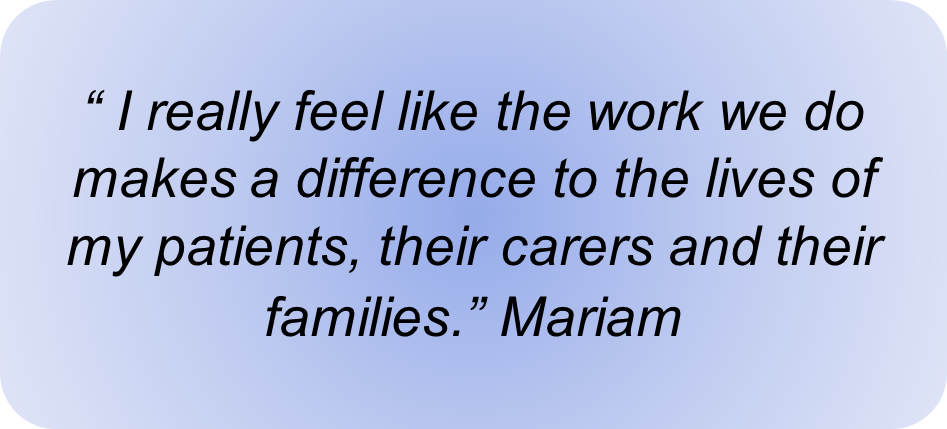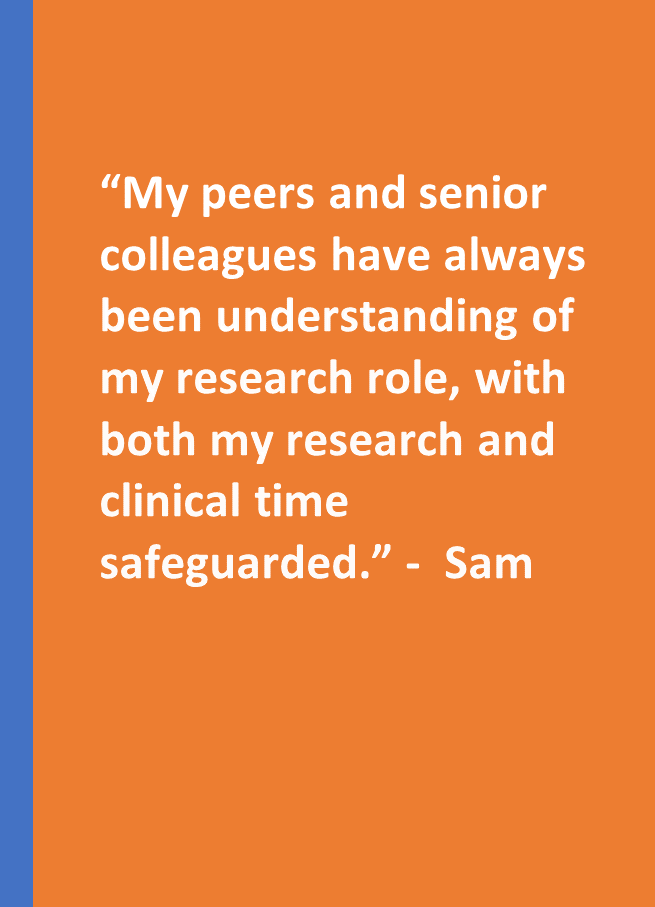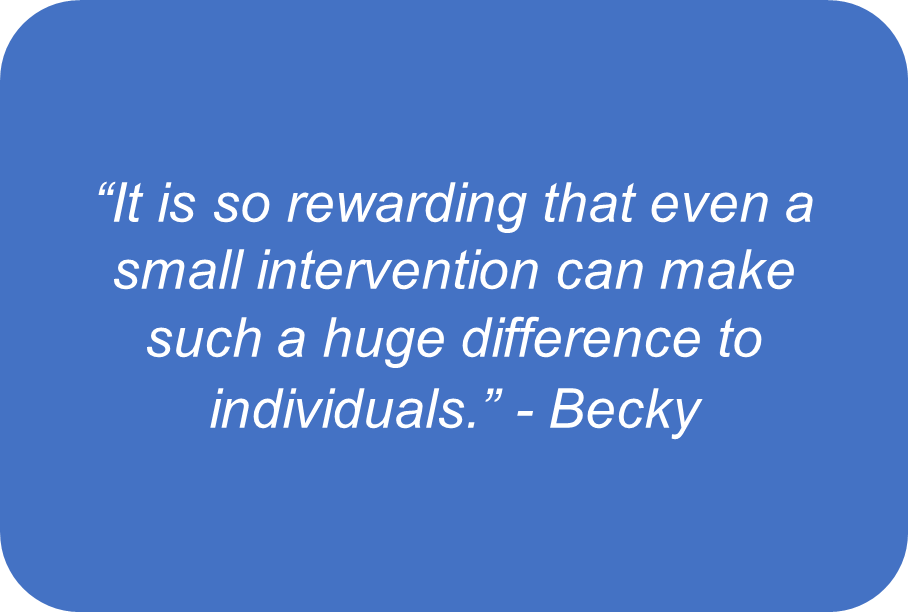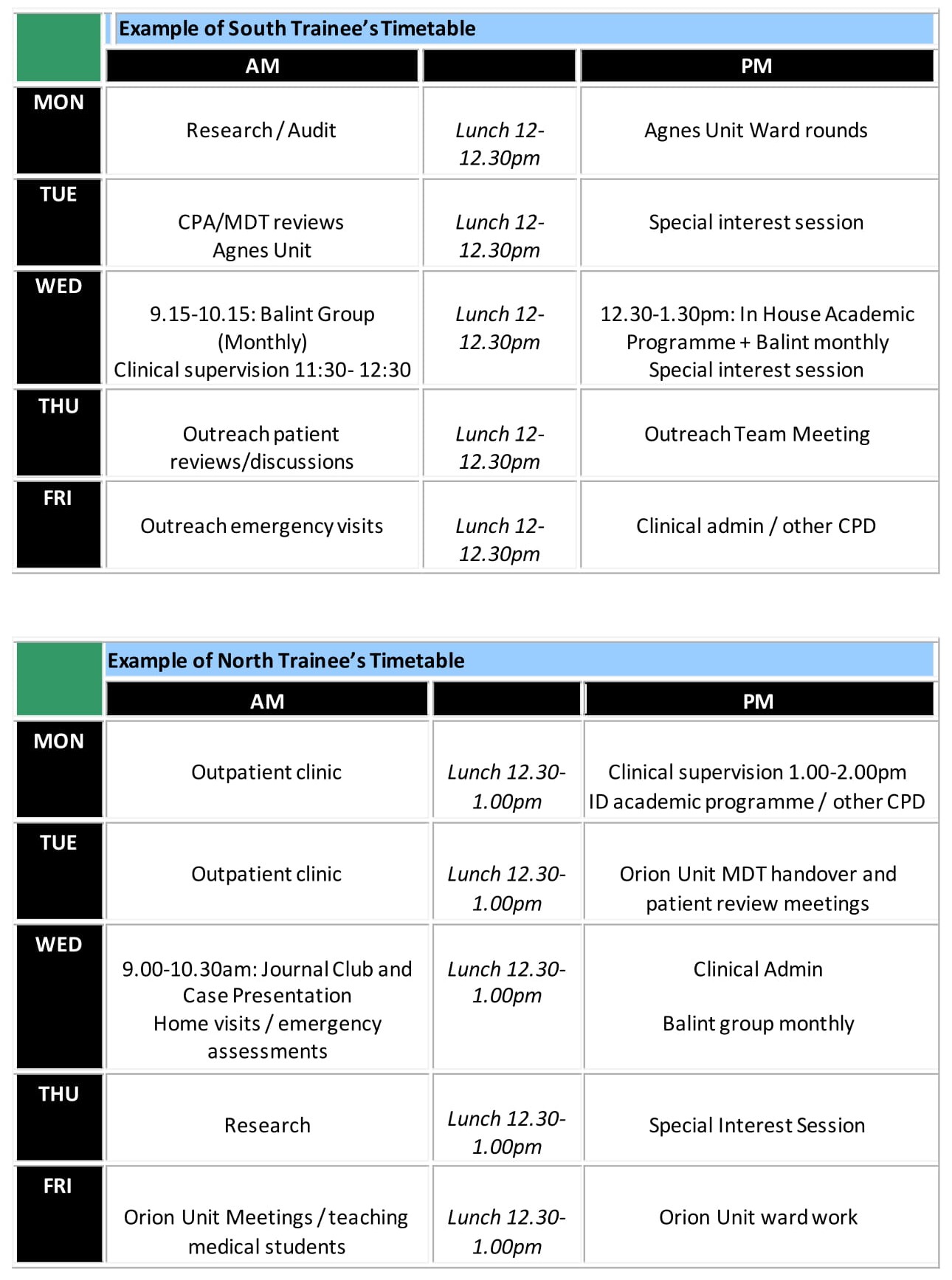Psychiatry of Intellectual Disability 
Why should I consider Specialty Training in Psychiatry of Intellectual Disability?
Psychiatry of Intellectual Disability is a fascinating, challenging and highly rewarding specialty involving work with some of the most vulnerable, marginalised and stigmatised people in society. It explores the close and complex relationship between mental health, physical health, behaviour and development. Trainees have the opportunity to work in a holistic and multidisciplinary way, using physical health expertise in addition to psychiatric expertise, recognising medication is just one of many treatment options. Excellent communication skills are developed, along with creative solutions for people with often complex, biopsychosocial problems.
Training covers the lifespan of people with Intellectual Disability and a wide range of additional neurodevelopmental, genetic, psychiatric and behavioural conditions. This allows trainees to gain a well-rounded skill set, to equip them for working as a Consultant, as well as providing skills for a wide choice of careers, including further sub-specialisation e.g. working in Neurodevelopmental Services. A larger workforce is needed for this growing specialty!
Local trainees and our Training Programme Director have produced a short video clip to highlight why we think you should consider Psychiatry of Intellectual Disabilities. We were intending to keep it to 3 minutes but we just had too much to fit in!
Training scheme:
We offer a three year higher training programme in Psychiatry of Intellectual Disability for doctors who have already demonstrated the essential competencies and completed core training from CT1 to CT3. Alternatively, to enter at the ST4 level, candidates should possess MRCPsych or equivalent qualification in addition to at least 3 years of experience after Foundation Year 1 training, out of which at least 30 months should be in the specialty of Psychiatry.
The postgraduate training programme is based on the Advanced Psychiatry of Intellectual Disability Curriculum as laid down by the Royal College of Psychiatrists (https://www.rcpsych.ac.uk/docs/default-source/training/curricula-and-guidance/psychiatry_of_learning_disability_curriculum_march_2019.pdf?sfvrsn=6b268e8c_6 ). It is designed to support training for obtaining a CCT in Psychiatry of Learning Disability by working towards an Annual Review of Competency Progression each year. Entry to the programme is through the National Recruitment System administered by Health Education England North West.
Experienced Consultant Trainers will provide supervision on a weekly basis throughout the training. Study leave will form part of the educational programme and is arranged in conjunction with the trainee’s Educational Supervisor and Training Programme Director. Trainees will take part in an on-call rota during evenings and weekends.
Who are the lead contacts for ID Psychiatry?
We are a very welcoming specialty – if you feel ID psychiatry might be for you, get in touch – we are happy to talk and arrange clinical experience.
- Training Programme Director and lead for Leicestershire – Dr Mary Barrett, Mary.barrett1@nhs.net
, Learning Disability Service, Agnes Unit 400, Anstey Lane, Leicester, LE7 7GL, 0116 295 3234.
- Nottinghamshire & Lincolnshire lead – Dr Deval Bagalkote, Deval.Bagalkote@nottshc.nhs.uk, Fern House, Highbury Hospital, Bulwell, NG6 9DR, 0115 9691300.
- St Andrews – Dr Farshad Shaddel, fshaddel@standrew.co.uk, LD and ASD Division, St Andrews Hospital, Northampton, NN1 5DG (Linked to the Leicester carousel).
- We also have links with Rampton as an approved training site.





What are the available clinical opportunities in the East Midlands?
Training in Intellectual Disability Psychiatry in the East Midlands provides a range of inpatient, outpatient, community and emergency work in urban and rural settings. This is a multidisciplinary profession and we receive a range of referrals covering mental illness, multiple and complex disabilities, challenging behaviour, autism, epilepsy, personality disorders and offending behaviours. The work involves seeing new and follow up patients in a variety of settings. There is also experience in preparing evidence for tribunals and potentially other court reports.
Trainees have the opportunity to access a wide range of placements relevant to their training, including Forensic Services across all levels of security and Child and Adolescent Mental Health Services including CAMHS-ID. Throughout the three years, trainees access a dedicated ID Psychotherapy Group to discuss complex cases from a psychological perspective.
There will also be two dedicated sessions a week for special interest tailored to your training needs and interests, for example clinical genetics, ASD, epilepsy, ADHD, neuropsychiatry, tics/Tourette’s, sensory impairment in ID, early onset dementia, developmental paediatrics and palliative care, as well as research (see below) the list goes on.
Where can I work?
The local trusts are well-established centres, with close links to national resources including the Royal College of Psychiatrists. The scheme operates as two carousels, one based in Leicester and the other in Nottingham, however there is ample opportunity for trainees to work across both centres to gain specific skills and clinical experience. They include the following:
- Leicestershire Partnership NHS Trust - 4 posts for ST4 - ST6 in Psychiatry of Intellectual Disability
- Nottinghamshire Healthcare NHS Trust - 4 posts for ST4 - ST6 in Psychiatry of Intellectual Disability
- Lincolnshire Partnership Foundation NHS Trust – 1 post for ST4 - ST6 in Psychiatry of Intellectual Disability (Linked to Nottinghamshire carousel)
What would my training look like?
The trainee will rotate between three posts during their training to spend 12 months developing skills in each placement. The training scheme also has national and international links, providing a unique opportunity for interested trainees to undertake placements in a variety of settings, including involvement with the Mental Health GAP programme.
- One year community experience
- One year inpatient and outreach experience
- Final year specialist ID competencies focus, working towards a 3 month acting up period
Teaching and academic:
Trainees receive great benefits from the monthly Specialty Teaching Programme, owned and run by the trainees, with Consultant support. These sessions provide an opportunity for trainees to develop leadership and management skills as well as continuing professional development, peer group discussion and support. Sessions have included Dementia, Psychological approaches for people with an Intellectual and developmental disorder, Mental Health law and Makaton signs and symbols. The schedule also incorporates a Neutral Representative meeting where trainees are offered a safe space to confidentially comment on any training issues which can be shared and subsequently resolved with support from the wider specialty training committee. Trainees also attend the weekly Academic Programme within the appropriate Department, and have opportunity to teach on the MRCPsych Teaching Programme. There is protected supervision incorporated in the timetable for one hour each week. Trainees are involved in medical student education and can also become mentors as part of the PsychStart programme.

Research and Quality Improvement:
Health Education East Midlands is an immensely supportive environment to train in Psychiatry of Intellectual Disability as part of Academic Clinical Fellow Posts. There is a strong research focus, and one trainee is currently undertaking a part-time PhD at the University of Leicester during their higher training, supported by the Trust and the National Institute of Health Research. Not only enjoyable but this experience has helped the trainee to develop further as both a clinician and researcher. There are also links with the Institute of Mental Health in University of Nottingham. These opportunities have led to prizes being won by trainees, such as the Alec Shapiro poster prize in 2017 and oral presentation prize in 2020. There are chances to undertake postgraduate qualifications, for example Diploma, PG certificate, Masters or MD.
Trainees are encouraged to use one of their special interest sessions each week for research, with opportunity for recruitment to multi-centre studies. This has led to Consultants and Trainees regularly publishing in peer-reviewed journals and authoring / editing key texts in the field, including the Oxford Textbook of Intellectual Disability and publishing the Frith Guidelines, the first ever national prescribing guidelines for Adults with Learning Disabilities (currently third edition), the only internationally recognised prescribing guideline in the field. There is a culture within the deanery where trainees are positively encouraged to take opportunities to develop in other areas in addition to clinical practice, such as quality improvement projects both through collaboration and in developing their own projects.
Leadership and management experience:
The East Midlands Intellectual Disability Services in Leicester and Nottingham have a long history of strongly promoting leadership and management at a local and national level and trainees in the scheme are actively encouraged and supported to develop their skills in this area. There is particular expertise locally, as the Deputy Chair of the ID Faculty (Dr. Biswas); the Chair of the ID Specialty Advisory Committee (Dr. Barrett) the Leicestershire Partnership NHS Trust Medical Director (Dr. Hiremath) and local Clinical Directors (Dr Gumber (Leicester) & Dr Jeenkeri (Notts)) are all ID Consultants in the region. Trainees will gain excellent experience in leadership and management, including having the opportunity to work with ID clinicians who undertake these leadership roles, as well as having support and time to lead on Quality Improvement initiatives, audit and other practical management projects. There are also many opportunities to take active leadership and management roles in the organisation local events that promote the specialty, such as Annual Neurodevelopmental Psychiatry Day and the Annual Therapeutics in Learning Disability Symposium.
Leadership and management topics are included in the local monthly academic programme for ID trainees and trainees are supported to attend the Health Education East Midlands leadership training days. A trainee with a particular interest in the area was recently sponsored to undertake the year-long Royal College of Psychiatrists Leadership and Management Fellowship, providing additional specialist training in the area at a national level.
What else should I know?
- Trainees are provided with furnished office space including a computer with internet access as well as IT facilities for remote working where needed
- There is flexibility within training (LTFT, External posts, Academic posts)
- Car parking is available on site, free of charge
- Each Team is supported by one or more medical secretaries who are based on-site
- Trainees are expected to drive his/her own vehicle. Home visits should be arranged in close liaison with the members of the multidisciplinary team. Higher specialist trainees are expected to travel during their on-call should the need arise
Useful links:
Royal College of Psychiatry https://www.rcpsych.ac.uk/training
Faculty of the Psychiatry of Intellectual Disabilities https://www.rcpsych.ac.uk/members/your-faculties/intellectual-disability-psychiatry
University of Leicester https://le.ac.uk/
Institute of Mental Health https://www.institutemh.org.uk/